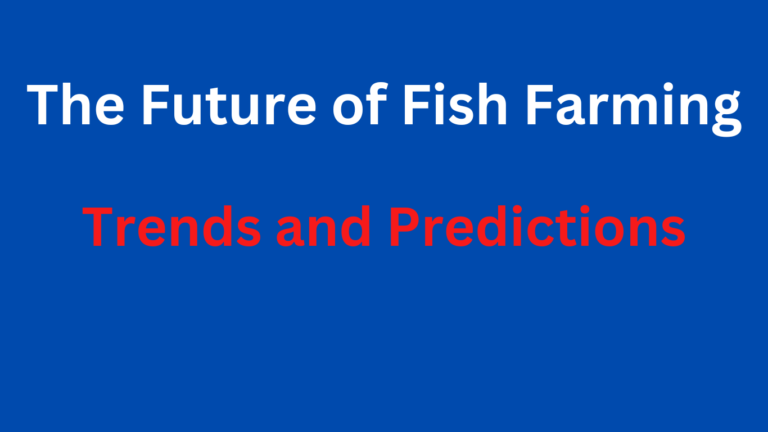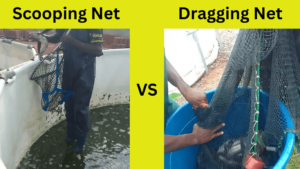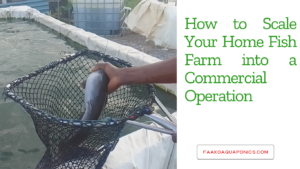The future of fish farming is a hope, trend, and innovations are for the future of fish farming. In as much as we already have modern ways of fish farming compared to those days, we still anticipate more technological equipment in the future.
In this article, we’ll explore these trends, discuss predictions, and delve into how the industry is evolving to address sustainability, technology, and consumer preferences.
1. Sustainable Practices
Sustainability is becoming a key focus in fish farming due to concerns about overfishing, environmental degradation, and the impact of aquaculture on ecosystems. The future of fish farming, Moving forward, there’s a strong push for more sustainable practices within the industry:
Closed-Loop Systems
These systems recycle water, minimize waste, and reduce the risk of pollution. The future of fish farming in a closed-loop system can be land-based or even integrated into urban environments.
Alternative Feeds
Traditional fish feed often relies on wild-caught fish, contributing to overfishing. Innovations in alternative feeds, such as plant-based or insect-based feeds, are gaining traction, reducing the industry’s reliance on wild fish stocks. And also automated feeding programs.
Eco-Certifications
Consumers are increasingly seeking eco-certified seafood, driving farms to adopt certification standards such as the Aquaculture Stewardship Council (ASC) or Best Aquaculture Practices (BAP). We need to acquire both local and international permits to operate fish farms.
A lot of fish farmers do not take the permit seriously. But I do recommend fish farmers should take that seriously in the future of fish farming.
2. Technological Advancements
Advancements in technology are revolutionizing fish farming, leading to increased efficiency, better monitoring, and improved yields. Below are some of the modern ways of fish farming and more will come in the future of fish farming.
Automation
Robotics and AI are being used to automate tasks such as feeding, monitoring water quality, and even harvesting. This not only reduces labor costs but also enables more precise management of fish health and welfare.
IoT Sensors
Internet of Things (IoT) sensors are being deployed to monitor water quality parameters such as temperature, oxygen levels, and pH level in real-time. This data helps farmers optimize conditions for fish growth and detect problems early.
Genetic Engineering
Research into genetic modification is aimed at developing fish with desirable traits such as faster growth rates, disease resistance, and improved feed conversion ratios. However, this area remains controversial due to concerns about environmental impacts and consumer acceptance.
3. Shifts in Species and Production Methods
The types of fish being farmed and the methods used are evolving to meet changing demand and overcome environmental challenges:
Diversification
Beyond traditional species like salmon and tilapia, there’s growing interest in farming new species such as barramundi, cobia, and even seaweed.
Diversifying species can reduce pressure on popular, over-farmed species and open up new markets. It will also bring more in the future of fish farming
Land-Based Aquaculture
Land-based fish farming, also known as Recirculating Aquaculture Systems (RAS), is gaining popularity due to its reduced environmental impact and greater control over production conditions. This method is particularly suited for high-value species like trout and sturgeon.
The RAS is a system that allows fish farmers to reuse water in the fish pond. The process cleans the water and take it back to the fish pond therefore reducing water wastage. The future of fish farming is going to have a more modernize RAS than we have today.
Integrated Multi-Trophic Aquaculture (IMTA)
IMTA systems combine different species, such as fish, shellfish, and seaweeds, to create a more balanced and sustainable ecosystem.
By utilizing waste from one species as feed or fertilizer for another, IMTA reduces environmental impacts and increases overall productivity. This allows you to create multiple fish species or types in one setup.
4. Consumer Trends and Market Forces
Consumer preferences and market dynamics play a significant role in shaping the future of fish farming. These include:
Demand for Sustainable and Ethical Products
Consumers are increasingly concerned about the environmental and ethical implications of their food choices. They seek out seafood that is sustainably produced, ethically sourced, and environmentally friendly.
Traceability and Transparency
There’s a growing demand for transparency in the seafood supply chain, with consumers wanting to know where their fish comes from, how it was farmed, and whether it meets certain standards for quality and sustainability.
Plant-Based Alternatives
As plant-based diets gain popularity, there’s a rising demand for plant-based seafood alternatives. Companies are innovating with plant-based fish substitutes, offering environmentally friendly options for consumers concerned about overfishing and fish welfare. We shall have a more plant-based diet in the future of fish farming.
5. Challenges and Opportunities
While the future of fish farming holds great promise, there are also challenges to overcome:
Environmental Impact
The future of fish farming will improve sustainability. Aquaculture can still have negative environmental consequences, such as pollution, habitat destruction, and the spread of diseases. Continued innovation and regulation will be necessary to mitigate these impacts.
Regulatory Hurdles
The fish farming industry is subject to a complex web of regulations, which can vary significantly between countries and regions.
Streamlining regulations and promoting international cooperation can help facilitate industry growth and ensure best practices are followed.
Consumer Education
Many consumers lack awareness about the benefits of sustainable aquaculture and may have misconceptions about farmed seafood.
Educating consumers about the importance of responsible fish farming and the role it plays in global food security is crucial.
Conclusion
The future of fish farming is bright, with innovations in sustainability, technology, and consumer preferences driving positive change. By embracing sustainable practices, leveraging technology, diversifying production methods, and responding to consumer demands, the industry is poised to meet the world’s growing appetite for seafood while minimizing its environmental footprint.
As we move forward, collaboration between industry stakeholders, regulators, and consumers will be key to realizing the full potential of aquaculture as a sustainable food source for generations to come. The Global Salmon Initiative says, “It is clear that the aquaculture industry has great potential in helping to provide a healthy and sustainable protein for future generations, but change is needed to ensure its future. While there is no silver bullet in making this possible, there are many opportunities to help the industry move in the right direction”




Next time I read a blog, I hope that it does not disappoint me just as much as this particular one. After all, Yes, it was my choice to read, nonetheless I actually thought you would probably have something helpful to say. All I hear is a bunch of crying about something that you could fix if you weren’t too busy searching for attention.
Hello there, I think your blog may be having web browser compatibility problems. Whenever I look at your website in Safari, it looks fine however when opening in Internet Explorer, it has some overlapping issues. I just wanted to provide you with a quick heads up! Other than that, great blog!
I’m pretty pleased to discover this great site. I wanted to thank you for your time for this particularly wonderful read!! I definitely enjoyed every little bit of it and I have you saved to fav to look at new things on your web site.
учеба в москве ооо уфк по г москвы адрес речные трамвайчики парк культуры в москве
маленькая квартира студия в москве купить в новостройке
Nice post. I learn something new and challenging on sites I stumbleupon every day. It’s always exciting to read through content from other writers and use a little something from their sites.
You are so awesome! I do not believe I’ve read something like that before. So great to discover another person with a few unique thoughts on this topic. Really.. many thanks for starting this up. This website is something that is required on the internet, someone with some originality.
Way cool! Some very valid points! I appreciate you penning this write-up and also the rest of the website is really good.
It’s nearly impossible to find well-informed people in this particular subject, but you sound like you know what you’re talking about! Thanks
It’s hard to come by knowledgeable people for this subject, but you seem like you know what you’re talking about! Thanks
You ought to take part in a contest for one of the highest quality sites on the web. I most certainly will highly recommend this blog!
Can I simply just say what a relief to find somebody who really knows what they are discussing on the net. You certainly realize how to bring a problem to light and make it important. More and more people need to read this and understand this side of the story. I was surprised you are not more popular given that you certainly possess the gift.
Hey there! I’m at work surfing around your blog from my new iphone 4!Just wanted to say I love reading through yourblog and look forward to all your posts! Carry on the great work!
Rattling good info can be found on website.?
hey there and thank you for your info – I’ve certainly
picked up anything new from right here. I did however expertise some technical
issues using this web site, since I experienced to reload the site a lot of times previous to I could get it to load correctly.
I had been wondering if your hosting is OK? Not that I’m
complaining, but slow loading instances times
will often affect your placement in google and could damage your
quality score if ads and marketing with Adwords. Anyway I’m adding this RSS to
my email and could look out for a lot more of your respective
interesting content. Ensure that you update this again soon..
Escape room lista
Thanks for sharing. I read many of your blog posts, cool, your blog is very good.